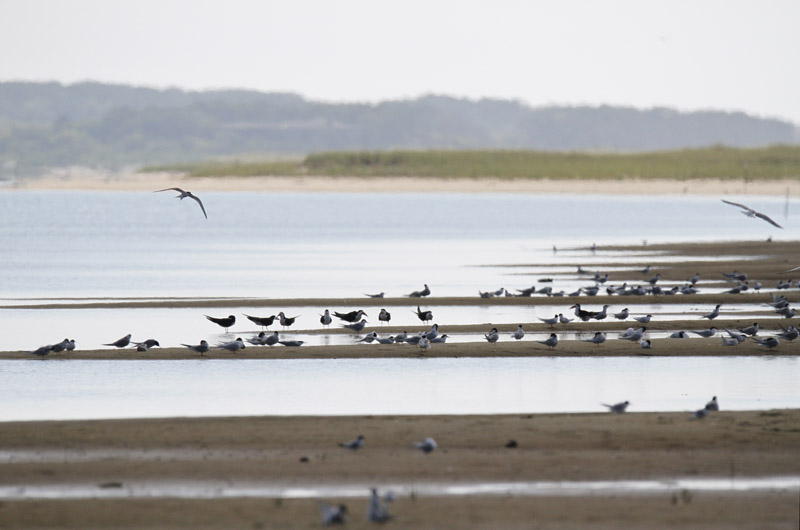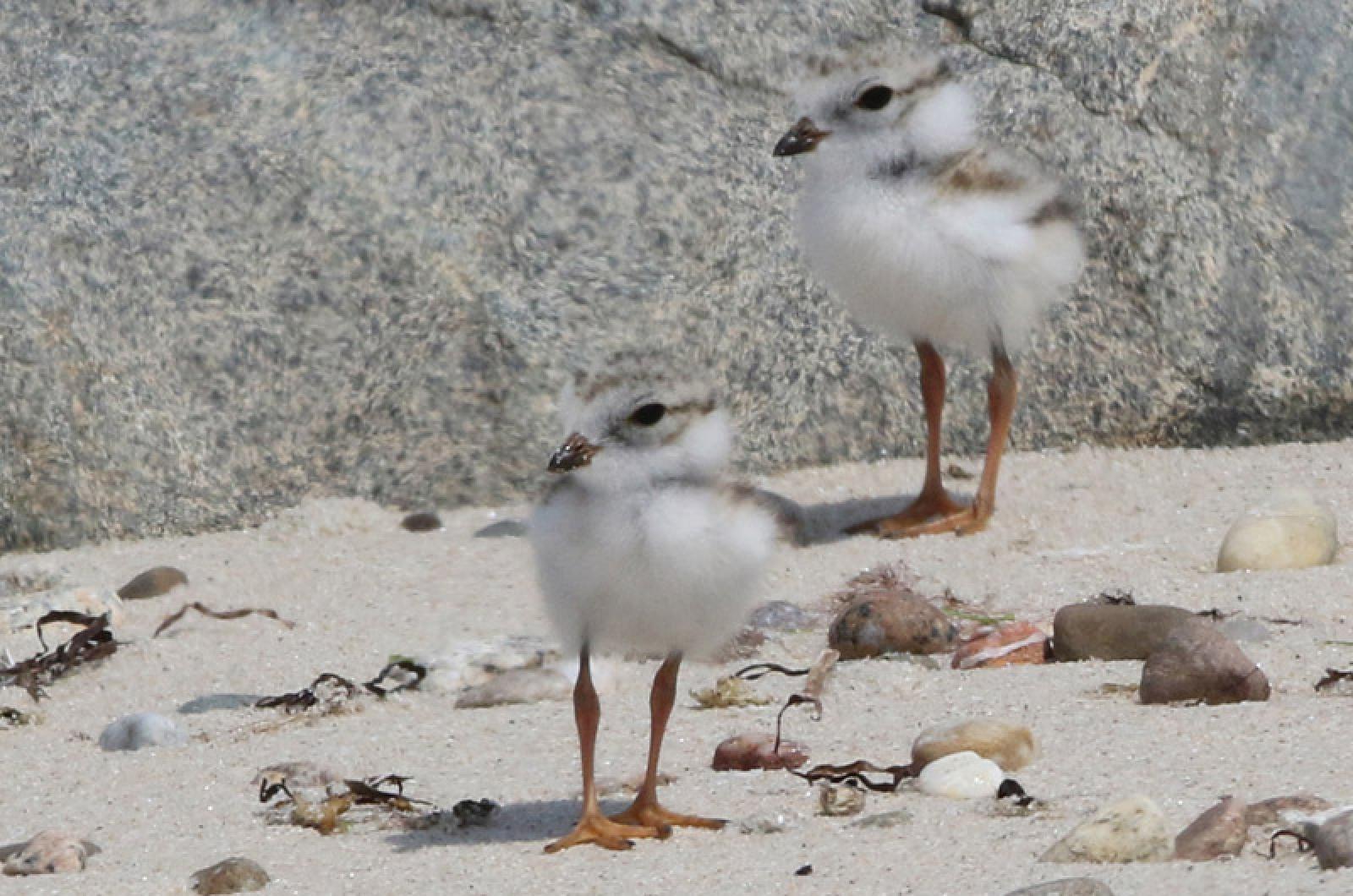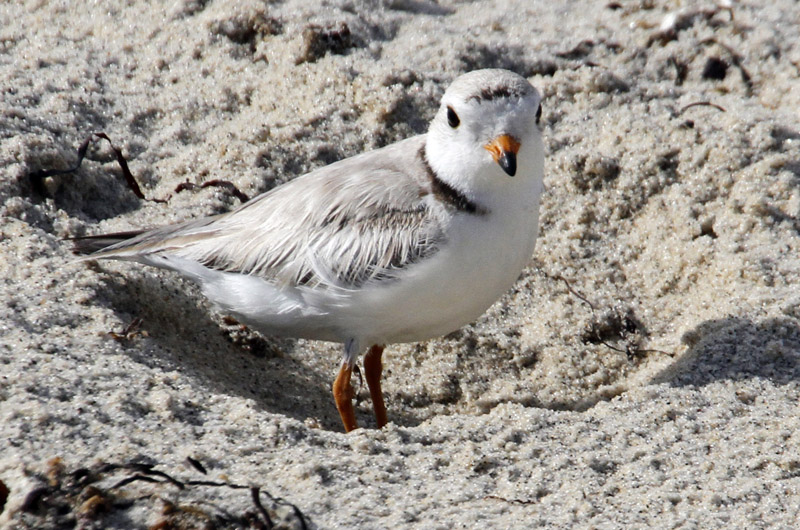As piping plovers continue to recover along the East Coast, federal and state agencies have announced a long-term management plan to allow communities to reopen beaches that would otherwise be closed to vehicles during nesting season in the spring.
The new 26-year habitat conservation plan, announced last week, is the first of its kind for piping plovers in the country.
The plan aims to balance conservation and recreation, and provide an overall benefit to the piping plovers, which are listed as threatened under both the federal and state endangered species acts.
“This is going to be a greatly streamlined process,” said Jon Regosin, chief of conservation science for the state Division of Fisheries and Wildlife, who helped develop the plan. In the past, communities that wanted to allow continued access to nesting areas were required to develop their own habitat conservation plans and apply for a federal permit.
Communities can now apply directly to the DFW, but additional conservation measures are required to offset an potential harm to the birds. In a media call last Friday announcing the new plan, Paul Phifer, assistant regional director of the U.S. Fish and Wildlife Service, praised the DFW for its conservation efforts over the last 30 years.

“They’ve really been the driving force for plover recovery,” he said. He also thanked the many stakeholder groups that provided feedback along the way. “This kind of large-scale, long-term planning is going to become a regional model, and Massachusetts is leading the way,” Mr. Phifer said.
Conservation measures since the 1980s have led to a major recovery of piping plovers along the Atlantic coast, especially in Massachusetts, where the population exceeds the regional target of 625 breeding pairs. Most pairs in Massachusetts nest on the Cape, with about 10 per cent on the Vineyard, and five per cent on Nantucket. But the revival has also led to more frequent beach closures, frustrating fisherman and other recreational users. Mr. Regosin said the state’s conservation efforts are often praised, but he also pointed out that conservation depends on the cooperation of stakeholders.
“It’s important to build some flexibility into it so they don’t feel that they’re being penalized for doing a good job and helping the birds,” he said.
At least 20 stakeholder groups, including The Trustees of Reservations and BiodiversityWorks on the Vineyard, helped shape the conservation plan. “I’d say that people really stepped up and were able to find common ground to get this thing done,” Mr. Regosin said. “It seems like there has been pretty broad support across the spectrum.”
The towns of Plymouth, Orleans and Barnstable, have already submitted requests for permits.
The Trustees, which owns and manages some 600 acres of protected barrier beach on Chappaquiddick, plan to apply for permits that would allow continued vehicle access along Leland Beach and Cape Pogue — two prime locations for saltwater fishing and birdwatching. The group has already submitted a proposal for Nantucket.
Russ Hopping, ecology program director for the Trustees, said the two plans for Chappaquiddick would be nearly identical, allowing vehicles in areas where usually a single plover pair will nest and the chicks sometimes move back and forth from the bay side to the ocean side of the beach.
In compliance with the state plan, a qualified escort would accompany each vehicle on foot, and vehicles would be allowed only during a six-hour daily window. The nesting sites themselves would be monitored hourly, adding to the cost of implementing the program.
The state plan outlines a number of mitigation strategies, including predator control, habitat improvement, enforcement and education. Mr. Hopping said the Trustees proposal would not include additional mitigation steps beyond the escorts and additional monitoring, but other measures as outlined in the state plan are well established on the trustees land.
“We’ve been doing just about everything we possibly can do,” Mr. Hopping said.
Norton Point, managed by the Trustees and owned by the county and another popular destination for fishing and birdwatching, is not included in the plan, due to its higher plover population and species richness. “It’s just not a feasible action to do there,” Mr. Hopping said. The increased flexibility at Leland beach and Cape Pogue could benefit the Vineyard economy as well as the plovers.
“I think the beaches are a main attraction,” Mr. Hopping said of the Vineyard in general. “And this makes at least a portion of our beaches more accessible to our visitors.”
The plovers are an attraction for birdwatchers and naturalists, as the beaches remain open to pedestrians throughout the season.
Piping plovers begin to arrive on the Vineyard around March and lay their eggs in scrapes in the sand. The tiny chicks, which hatch in May or June, are precocious at birth, feeding themselves in the wrack line along beaches, but will not fledge for weeks, making them vulnerable to vehicles. Temporary fencing can help protect the eggs from predators.
Last year the number of plovers in the state accounted for about three quarters of all plovers in New England. But the number of fledglings per pair, which is the primary measure of reproductive success, fluctuates from year to year. The state counted 1.29 fledglings per pair in 2015 — just over the threshold of 1.2 per pair needed to keep the population in balance. The Vineyard as a whole came in somewhat low, with just 1.05 fledglings per pair.
Mr. Hopping said the plovers on Chappaquiddick this year were ahead of previous years in terms of chicks per pair, but it was still early in the season. “I do not like to count my chicks until they are fledged,” he said.
To provide a continued benefit to the shorebirds, the state plan allows for only a small percentage of takes, or instances of harm, based on the total plover population. And if the population drops below 500 pairs, then no takes are allowed. (Based on current numbers, the rules would permit the loss of about 45 breeding pairs this year.)
Mr. Hopping said he did not believe the proposals for Chappaquiddick would lead to any plover deaths, and sees the new rules as benefitting birds and beachgoers alike.
“It should be a win-win situation,” he said.





Comments
Comment policy »